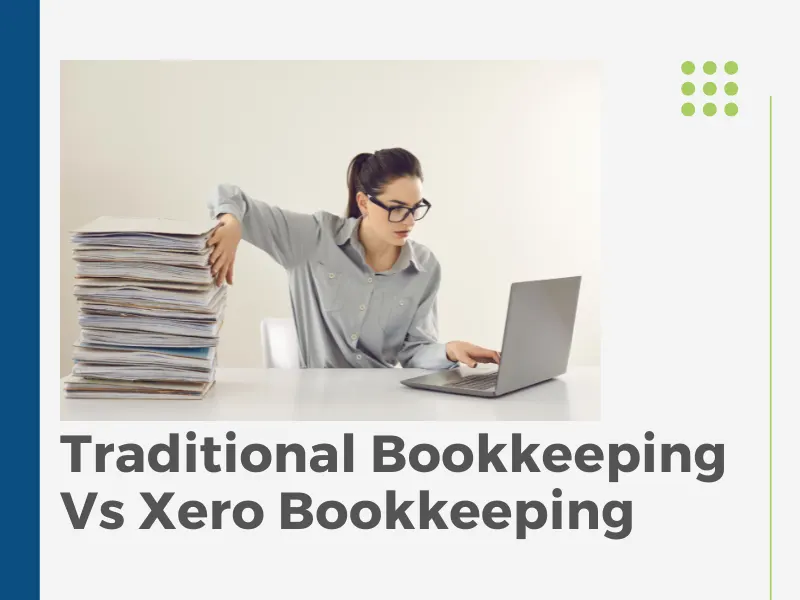I. Introduction
Bookkeeping is the process of recording, organising, and managing financial transactions for a business. It plays a critical role in helping businesses make informed decisions about their finances and ensuring compliance with tax laws and regulations. In the past, bookkeeping was a manual process that involved recording transactions in a physical ledger or journal. However, with advances in technology, bookkeeping software has become increasingly popular, with Xero being one of the most widely used platforms.
In this article, we’ll explore the differences between traditional bookkeeping and Xero bookkeeping. We’ll first take a closer look at traditional bookkeeping and the tools and processes used in this method. We’ll then introduce Xero bookkeeping and the features and benefits of using this cloud-based software. Finally, we’ll compare the two methods and explore the advantages and disadvantages of each, providing businesses with a better understanding of which approach may be right for their needs.

II. Traditional Bookkeeping
Traditional bookkeeping refers to the manual process of recording financial transactions in a physical ledger or journal. It involves keeping track of every transaction, including purchases, sales, and payments, and organising them in a systematic manner.
Manual bookkeeping processes and tools include the use of ledgers, journals, and worksheets, as well as tools such as calculators, pencils, and erasers. Bookkeepers manually record every transaction and organise them into various categories, such as accounts payable, accounts receivable, and general ledger.
Advantages of traditional bookkeeping include the fact that it is a low-cost solution that requires minimal technology and training. Additionally, traditional bookkeeping allows for more personalised attention and customisation of financial reports. However, there are also several disadvantages to traditional bookkeeping, including the risk of human error, time-consuming processes, and limited scalability.
Many industries and businesses still use traditional bookkeeping, including small businesses, sole proprietors, and non-profits. For example, some small businesses may find traditional bookkeeping to be more cost-effective and manageable than investing in accounting software. Non-profits may also rely on traditional bookkeeping to carefully track donations and expenses in a detailed manner.
However, as technology continues to advance and cloud-based accounting software becomes more prevalent, traditional bookkeeping may become less common. In the next section, we’ll introduce Xero bookkeeping and explore how it differs from traditional bookkeeping.

III. Xero Bookkeeping
Xero bookkeeping is a modern approach to managing financial transactions using cloud-based accounting software provided by Xero. It offers a range of features and benefits that streamline the bookkeeping process and enhance the efficiency and accuracy of financial record-keeping.
Xero software allows businesses to record and track transactions, generate financial reports, manage invoices and expenses, and perform other essential bookkeeping tasks electronically. It provides a user-friendly interface that simplifies the recording and organisation of financial data.
Some key features and benefits of Xero bookkeeping include:
Cloud-based access and collaboration: Xero operates entirely in the cloud, enabling businesses to access their financial data from anywhere with an internet connection. Multiple users can collaborate simultaneously, allowing for efficient teamwork and real-time updates.
Automation and integration with other software: Xero automates many bookkeeping tasks, such as bank reconciliations, invoicing, and payment reminders. It also integrates with other business software, such as customer relationship management (CRM) systems and inventory management tools, streamlining data flow and eliminating the need for manual data entry.
Time-saving and efficiency: Xero’s automation features significantly reduce manual data entry and repetitive tasks, saving time for bookkeepers and enabling them to focus on higher-value financial analysis and strategic decision-making.
Real-time reporting and insights: Xero provides up-to-date financial reports and dashboards that offer real-time insights into business performance. This enables timely decision-making and helps businesses stay on top of their financial health.
Various industries and businesses benefit from Xero bookkeeping. For instance:
* Small and medium-sized enterprises (SMEs) often find Xero’s user-friendly interface and affordability appealing.
* Startups and digital businesses leverage the cloud-based nature of Xero to access financial information on the go and collaborate with team members or remote accountants.
* Service-based businesses, such as consultants or agencies, benefit from Xero’s invoicing and payment tracking capabilities.
* Retail and e-commerce businesses find value in Xero’s inventory management integration and automated sales reconciliation.
* Overall, Xero bookkeeping offers a modern and efficient solution for businesses looking to streamline their financial record-keeping processes, gain valuable insights, and enhance collaboration within their organisation.
IV. Comparison: Traditional Vs Xero Bookkeeping
When considering the choice between traditional bookkeeping and Xero bookkeeping, several key factors come into play. Let’s compare them across various aspects:
1. Accuracy:
* Traditional bookkeeping: The risk of human error is higher with manual data entry and calculations.
* Xero bookkeeping: Automation reduces the likelihood of errors, ensuring greater accuracy in financial records.
2. Efficiency:
* Traditional bookkeeping: Manual processes can be time-consuming, requiring significant effort for tasks like reconciling accounts or generating reports.
* Xero bookkeeping: Automation streamlines various tasks, saving time and improving efficiency. Real-time data access and collaboration features enhance productivity.
3. Security:
* Traditional bookkeeping: Physical ledgers and journals are vulnerable to loss, damage, or unauthorised access.
* Xero bookkeeping: Data is stored securely in the cloud, backed up regularly, and protected by encryption, reducing the risk of data loss or breaches.
4. Cost:
* Traditional bookkeeping: Initial costs may be lower since it primarily relies on physical tools. However, the time investment and potential for errors may lead to higher long-term costs.
* Xero bookkeeping: While there is a subscription cost for using Xero, the time saved through automation and increased accuracy can result in cost savings in the long run.
Real-world examples and case studies can shed light on the benefits of Xero bookkeeping. For instance, Company A, a small marketing agency, implemented Xero and saw a significant reduction in time spent on manual data entry and reconciliation, allowing them to focus on client projects and growth.
However, it’s important to consider potential challenges and limitations of Xero bookkeeping:
* Learning curve: Transitioning to new software requires some training and adjustment, which may initially slow down bookkeeping processes.
* Internet reliance: Xero’s cloud-based nature means an internet connection is necessary for accessing data, which can be a limitation in areas with unreliable connectivity.
* Customisation limitations: While Xero offers a range of features, some businesses with unique or complex needs may find limitations in terms of customisation options.
By carefully weighing the benefits and limitations of Xero bookkeeping against traditional methods, businesses can make an informed decision about the approach that aligns best with their specific requirements and goals.
V. Conclusion
In conclusion, the choice between traditional bookkeeping and Xero bookkeeping boils down to the specific needs and priorities of your business. Traditional bookkeeping, while cost-effective and customisable, can be time-consuming and prone to errors. On the other hand, Xero bookkeeping offers automation, efficiency, real-time reporting, and enhanced collaboration through its cloud-based software.
With Xero bookkeeping, businesses can leverage features such as accuracy, efficiency, security, and cost savings. Real-world examples demonstrate the tangible benefits that companies have experienced through the adoption of Xero.
However, it is important to consider potential challenges and limitations, such as a learning curve and reliance on internet connectivity. Customisation options may also be limited for businesses with unique or complex needs.
To make an informed decision and determine the best approach for your business, it is advisable to consult with professionals who specialise in bookkeeping services. The Bookkeeper Hub is here to assist you in navigating the complexities of bookkeeping, whether you opt for traditional methods or choose to transition to Xero bookkeeping.
Don’t let bookkeeping become a burden on your business’s growth and success. Contact the Bookkeeper Hub today to explore how our expert bookkeeping services can help streamline your financial processes, provide accurate insights, and enable you to focus on what you do best – running and expanding your business.
Remember, proper bookkeeping lays the foundation for sound financial management and informed decision-making. Let the Bookkeeper Hub be your trusted partner in managing your bookkeeping needs effectively and efficiently.






